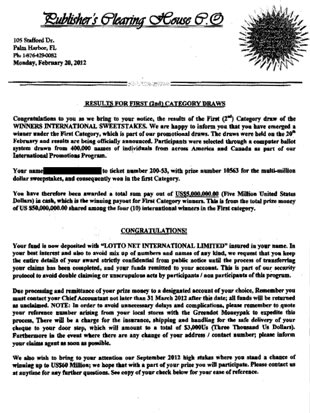Elderly man scammed for thousands, kids? lives threatened

A whizbang in the insurance and financial worlds for decades, a spry retiree in Chicago was the last guy his children imagined they'd see snared in a money scam.
But in a mere month earlier this year the 80-year-old grandfather was conned out of an estimated $25,000.
"It might even be more," his oldest son said.
Once the victim's kids caught on, the scam got scarier.
"These people threatened to kill me on more than one occasion," the son said.
Still, they want their father's story told. To protect their identity, Yahoo News is not naming the elderly victim or his family.
"If it can happen to my dad, it can absolutely happen to anyone else," the son said.
Federal officials agree and are sounding the alarm. A government report released this month described elder financial exploitation as an "epidemic with societywide repercussions." While this type of fraud is woefully underreported and often overlooked, officials estimate that Americans 65 and older are taken for nearly $3 billion a year.
Elder fraud comes in all forms, including the lottery scam pulled on the Chicago widower. A Feb. 20 letter in the style of Publishers Clearing House sweepstakes informed the widower he'd won at least $5 million. To claim his prize, the letter said, he would need to send $3,000 to cover "insurance, shipping and handling for the safe delivery."
He complied, but the fraudsters kept calling back for more. Time and again, he'd go to neighborhood stores and wire money by the hundreds and thousands. In mid-March, one of his children paid a visit and spotted money transfer receipts scattered about.
 Fraud letter sent to Chicago victim
Fraud letter sent to Chicago victim
"My dad became hush-hush and actually tried to hide stuff," the son told Yahoo News. "That was totally out of character for my dad. And he came up with a BS story that my brother did not believe."
His children alerted the Illinois attorney general, Publishers Clearing House and the financial institutions involved. MoneyGram and Western Union blocked the 80-year-old's accounts, but he continued to get calls from strangers in New York and Jamaica. His sons intercepted some of the calls, which turned threatening when the sons refused to put their father on the phone.
"They said they could see us through the window, that they were going to shoot us that afternoon," his son said.
The family and others familiar with the case believe the original fraudsters sold the victim's information to other fraudsters. One female caller told the son she was his father's girlfriend. Others knew personal details about the elderly man, like his dog's name.
"Anything to get through to my dad," said the son, who doubts his father will ever see justice or restitution. "They're good, they're organized and they are ruthless."
Chris Irving, assistant vice president of consumer and legal affairs at Publishers Clearing House, says imposters are a thorn in the company's side.
"Our efforts to get the criminals to stop using our name are numerous," Irving said. "And at the end of the day, perhaps the most effective deterrent is the comprehensive education we provide to consumers through many different programs that reminds them that if you have to pay to win, it is not a legitimate prize and it is certainly not from the real Publishers Clearing House."
[RELATED: Federal judge OKs MoneyGram fraud deal, $100M fund]
Nine months later, the man's children are still puzzled by how their financially astute father fell for the scam.
"My dad was and is still in denial," the son said. "He told the police that it was a very small amount, but we know he fibbed."
Shame and fear of losing their independence keeps elders from reporting such crimes, but Pamela Teaster, a gerontologist, says executive function is often the first sign of cognitive decline in seniors.
"That's where that sort of reasoning and dealing with numbers issue comes into play," said Teaster, who heads the University of Kentucky's Justice Center for Elders and Vulnerable Adults.
Criminal gangs are noticing the growing elder population in the United States.
"They have the nation's wealth," Teaster said. "That's where the money resides."
The Government Accountability Office recently called on the Federal Trade Commission, Justice Department, Health and Human Services and other federal agencies to step up efforts to combat elder financial exploitation.
"It calls for a more cohesive and deliberate approach governmentwide that, at a minimum, identifies gaps in efforts nationwide, ensures that federal resources are effectively allocated, establishes federal agency responsibilities, and holds agencies accountable for meeting them," the GAO report concluded.
"Often the response has been disjointed," Sen. Richard Blumenthal, D-Conn., said in a speech at the inaugural meeting of the Elder Justice Coordinating Council in October. The new multiagency federal council is charged with creating a better road map for elder justice.
[RELATED: Yellow pages scammers ordered to pay back $10 million]
Cases like the one in Chicago often fall through the cracks because of overlapping local, state and federal jurisdictions or limited resources for law enforcement. Privacy and antitrust laws complicate matters, too.
Publishers Clearing House and money transfer companies already report fraud to the government. But Kim Garner, MoneyGram's senior vice president of global security, said more crime patterns could be identified if the FTC would allow business and law enforcement networks to share fraud data.
"If we could come up with new ways of sharing information that doesn't violate antitrust or privacy laws, that would be a step in the right direction," Garner said.
Garner, a former Secret Service agent, was hired in 2010 to help MoneyGram beef up security after prosecutors accused the company of turning a blind eye to scam artists and money launderers from 2003 to 2009.
On Wednesday, a federal judge approved a settlement on the fraud charges against the Dallas-based payment service agency, including the establishment of a $100 million victim compensation fund.
Garner and her MoneyGram team now help police where they can. Fraud-detection software implemented in 2010 is constantly updated to try and catch scams before a transaction is complete.
"Because the bad guys get really good at the rules," she said.
No one knows that better than the Chicago victim and his family.
After their father was blocked from wiring money, the shysters persuaded him to open new checking and savings accounts. They gained online access but were stopped before they could play switcheroo with his money.
"God only knows what he might have lost," the son said.
Fraud prevention resources:
? File a complaint with the FTC
? MoneyGram's fraud prevention tips
? FBI advice for senior citizens
ehlers danlos syndrome the closer michael turner split pea soup land of the lost cleveland cavaliers cleveland cavaliers

0টি মন্তব্য:
একটি মন্তব্য পোস্ট করুন
এতে সদস্যতা মন্তব্যগুলি পোস্ট করুন [Atom]
<< হোম